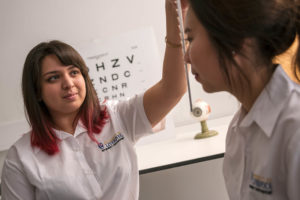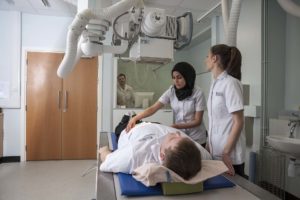How you'll learn
Learning is promoted through a wide variety of activities that enable students to become autonomous and continuous learners. Interactive lectures, practical and clinical skills group work, simulation, directed study, role play, problem based learning, small group work, student-led seminars, collaborative project work and interactive tutorials are key learning strategies for this programme.
Practical work using our imaging suite digital equipment, 3D virtual reality radiotherapy facility, Clinical Skills Resource Room and the Human Anatomy Resource Centre complement teaching activities.
Face-to-face interactions between all students will occur at shared lectures, tutorials and group work and online interaction will be encouraged and facilitated as are inter-professional education and learning opportunities across all healthcare professions programmes.
How you're assessed
Using a mixture of coursework and examination, a range of assessment methods can be seen across this programme. These include seen and unseen written examinations, essay assignments with specific word lengths, multiple choice questions, case study presentations and interactive practical examinations.
Assessment of the work-based learning element of all programmes will be an important aspect of your studies. You will be required to communicate your views orally and in written form; analyse, implement and evaluate your practice; and to extend the research and evidence base of your chosen profession.
The various methods of assessments have been chosen to provide a balance that will permit the undergraduates to demonstrate their intellectual abilities in all areas to the full.
Liverpool Hallmarks
We have a distinctive approach to education, the Liverpool Curriculum Framework, which focuses on research-connected teaching, active learning, and authentic assessment to ensure our students graduate as digitally fluent and confident global citizens.
The Liverpool Curriculum framework sets out our distinctive approach to education. Our teaching staff support our students to develop academic knowledge, skills, and understanding alongside our graduate attributes:
- Digital fluency
- Confidence
- Global citizenship
Our curriculum is characterised by the three Liverpool Hallmarks:
- Research-connected teaching
- Active learning
- Authentic assessment
All this is underpinned by our core value of inclusivity and commitment to providing a curriculum that is accessible to all students.







